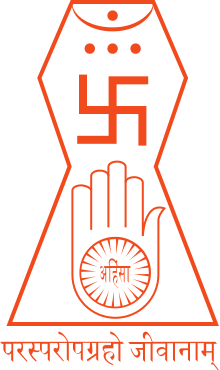Pudgala
| Part of a series on |
| Jainism |
|---|
 |
|
Jain prayers |
|
Ethics |
|
Major figures |
|
Major sects |
|
Festivals |
|
Pilgrimages |
|
|
In Jainism, Pudgala (or Pudgalāstikāya) is one of the six Dravyas, or aspects of reality that fabricate the world we live in. The six dravyas include the jiva and the fivefold divisions of ajiva (non-living) category: dharma (motion), adharma (rest), akasha (space), pudgala (matter) and kala (time).[1] Pudgala, like other dravyas except kala is called astikaya in the sense that it occupies space.
Pudgala is derived from the words 'pud', which is defined as Supplement (Addition /Fusion), and gala, which is defined as Disintegrate, or Division or Fission. Therefore, Pudgalas are best defined as all things that are continuously changing by the process of Supplementation or Disintegration, namely matter.
The individual unit of Pudgala is the material from which all is made, smaller than atoms, called a Paramänu, which, by the process of supplementation, can combine to form what can be roughly said is an atom, called a Skandha, of which, a part is known as a Desha (an electron, proton, or neutron). It possesses at all times four qualities, namely, a color (varna), a taste (rasa), a smell (gandha), and a certain kind of palpability (sparsha, touch).[2]
In Buddhism, Pudgala means the entity that reincarnates as an individual or person, i.e., the bundle of tendencies that keeps an individual reincarnating until they attain enlightenment.[3]
See also
Notes
- ↑ Sharma, Chandradhar (1960, reprint 1997). A Critical Survey of Indian Philosophy, Delhi: Motilal Banarsidass, ISBN 81-208-0365-5, p.63
- ↑ Jaini 1998, p. 90.
- ↑ Dasgupta, Surendranath (1975, reprint 2010). A History of Indian Philosophy, Vol.I, Delhi: Motilal Banarsidass, ISBN 978-81-208-0412-8, p.195n
References
- Jaini, Padmanabh S. (1998) [1979], The Jaina Path of Purification, Delhi: Motilal Banarsidass, ISBN 81-208-1578-5